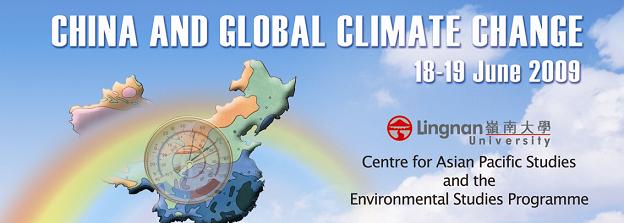
Event Title
Conference on China and Global Climate Change : Reconciling International Fairness and Protection of the Atmospheric Commons
Start Date
18-6-2009 9:15 AM
End Date
18-6-2009 9:45 AM
Language
English
Description
In December 2009, diplomats will meet in Copenhagen to finalize what many hope will be a strong agreement to fight global warming and climate change. They will grapple with how to address these problems in light of new scientific findings showing that the adverse effects of global warming are happening sooner and are more severe than scientists predicted only a year or two ago. Some countries, notably in Europe, have started to take serious steps to limit and in several cases reduce their emissions of carbon dioxide and other greenhouse gases.
However, those efforts have been very slow in coming, and any politically realistic scenarios for action by industrialized countries in the next decade or two will be swamped by increasing emissions from the developing world.
One reason for the world's slow and weak response to climate change is a game of "you go first" being played between rich and poor countries, particularly between China and the United States. Both of these latter countries now agree that much more needs to be done. The United States no longer denies the problem, and China has come to acknowledge its major role. At the same time, China rightly expects the United States and other wealthy countries to do much more to reduce their pollution and provide aid to help developing countries grow more sustainably and cope with the effects of climate change. After all, China's average per capita emissions of greenhouse gases remain well below those in the developed world. However, owing to its large population and rapid economic growth, China's emissions are ballooning. It has overtaken the United States to become the most polluting country in the world, and within the next twenty years or so its emissions of carbon dioxide will account for nearly one-third of the global total.
Document Type
Event
Recommended Citation
Harris, P. G. (2009). Introduction. In China and global climate change: Proceedings of the conference held at Lingnan University, Hong Kong, 18-19 June 2009 (pp. 1-2). Centre for Asian Pacific Studies and the Environmental Studies Programme, Lingnan University, Hong Kong.
Included in
Introduction
In December 2009, diplomats will meet in Copenhagen to finalize what many hope will be a strong agreement to fight global warming and climate change. They will grapple with how to address these problems in light of new scientific findings showing that the adverse effects of global warming are happening sooner and are more severe than scientists predicted only a year or two ago. Some countries, notably in Europe, have started to take serious steps to limit and in several cases reduce their emissions of carbon dioxide and other greenhouse gases.
However, those efforts have been very slow in coming, and any politically realistic scenarios for action by industrialized countries in the next decade or two will be swamped by increasing emissions from the developing world.
One reason for the world's slow and weak response to climate change is a game of "you go first" being played between rich and poor countries, particularly between China and the United States. Both of these latter countries now agree that much more needs to be done. The United States no longer denies the problem, and China has come to acknowledge its major role. At the same time, China rightly expects the United States and other wealthy countries to do much more to reduce their pollution and provide aid to help developing countries grow more sustainably and cope with the effects of climate change. After all, China's average per capita emissions of greenhouse gases remain well below those in the developed world. However, owing to its large population and rapid economic growth, China's emissions are ballooning. It has overtaken the United States to become the most polluting country in the world, and within the next twenty years or so its emissions of carbon dioxide will account for nearly one-third of the global total.

